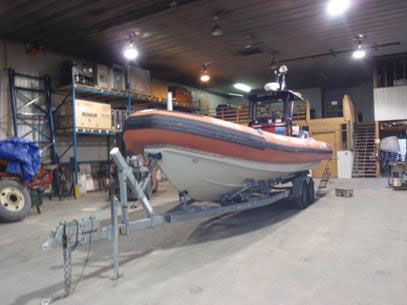Collision
Passenger vessel C03097QC
Les Bergeronnes, Quebec
Passenger vessel C03097QC
Les Bergeronnes, Quebec
The occurrence
On 29 August 2016, at approximately 1223 Eastern Daylight Time, the rigid-hull inflatable passenger vessel C03097QC known as the Aventure 6, with 9 people on board, collided with an unidentified object while conducting a marine mammal observation tour off Les Bergeronnes, Quebec. One passenger and the operator were thrown overboard, subsequently recovered, and later treated for hypothermia. Another passenger was treated for injuries caused by the impact. The 3 injured persons were taken by ambulance from the dock in Les Bergeronnes to Les Escoumins, Quebec. The vessel's outboard engines were damaged.
Media materials
News release
Lack of safety management cited in August 2016 whale-watching accident in Saguenay–St. Lawrence Marine Park
Read the news release
Deployment notice
TSB deploys a team to a collision between a passenger vessel and a whale near Les Escoumins, Quebec
Richmond, British Columbia, 12 July, 2016 — The Transportation Safety Board of Canada (TSB) is deploying a team of investigators to Port Coquitlam, BC, to gather information and assess an occurrence involving the tug Ken Mackenzie as it transited the Fraser River.
Investigation information
Download high-resolution photos from the TSB Flickr page.
Class of investigation
This is a class 3 investigation. These investigations analyze a small number of safety issues, and may result in recommendations. Class 3 investigations are generally completed within 450 days. For more information, see the Policy on Occurrence Classification.
TSB investigation process
There are 3 phases to a TSB investigation
- Field phase: a team of investigators examines the occurrence site and wreckage, interviews witnesses and collects pertinent information.
- Examination and analysis phase: the TSB reviews pertinent records, tests components of the wreckage in the lab, determines the sequence of events and identifies safety deficiencies. When safety deficiencies are suspected or confirmed, the TSB advises the appropriate authority without waiting until publication of the final report.
- Report phase: a confidential draft report is approved by the Board and sent to persons and corporations who are directly concerned by the report. They then have the opportunity to dispute or correct information they believe to be incorrect. The Board considers all representations before approving the final report, which is subsequently released to the public.
For more information, see our Investigation process page.
The TSB is an independent agency that investigates air, marine, pipeline, and rail transportation occurrences. Its sole aim is the advancement of transportation safety. It is not the function of the Board to assign fault or determine civil or criminal liability.
